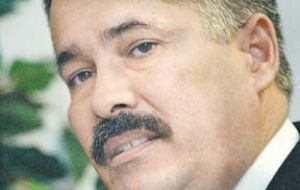MercoPress. South Atlantic News Agency
Obama administration and Cuba agree to further dialogue
 Dagoberto Rodríguez Barrera, Cuba's deputy Foreign Minister described the first round of talks as “fruitful”.
Dagoberto Rodríguez Barrera, Cuba's deputy Foreign Minister described the first round of talks as “fruitful”. The first talks between US President Barrack Obama’s administration and Cuba ended with an invitation for US diplomats to visit Havana in December, marking the official beginning of the first dialogue between Havana and Washington in six years.
The invitation came as the head of the Cuban delegation characterized the six-hour gathering in New York as a ``fruitful working session.''
''Progress was made in the identification of areas in which both countries should work and cooperate . . . '' Dagoberto Rodríguez Barrera, Cuba's deputy foreign minister, said in a statement.
The Cuban delegation said it had submitted a proposal to US representatives for a new immigration agreement and ``more effective cooperation to combat illegal alien smuggling.''
The talks were led by Craig Kelly, principal US deputy assistant secretary of the State Department's Bureau of Western Hemisphere Affairs. The delegation included representatives of the Department of Homeland Security, Department of Justice and US Coast Guard.
The last previous talks took place in 2003. President George W. Bush suspended them the following year, citing a lack of cooperation from Cuba. The talks concern migration agreements from the mid-1990s that aim to prevent waves of boat people leaving Cuba and risking their lives to reach the US.
“Engaging in these talks underscores our interest in pursuing constructive discussions with the government of Cuba to advance US interests on issues of mutual concern,” State Department spokesman Ian Kelly said in a statement.
The US outlined a number of issues, according to Mr Kelly. These included: gaining access to a deepwater port in Cuba to return migrants safely; ensuring that US diplomats can track the welfare of those sent back; having all Cuban nationals accepted back, including those who committed crimes in the US and are therefore ineligible to become citizens; ensuring that the US Interests Section in Havana can operate “fully and effectively”.
Cuba, for its part, repeated its objection to US policy that repatriates Cuban migrants intercepted at sea but allows Cubans who make it to US shores to stay.
This “wet foot, dry foot” policy “encourages illegal departures and human smuggling”, a Cuban statement said.
Cuban-American immigration expert Jose Pertierra says this policy has led not only to people embarking on risky sea journeys across the Florida Straits, but has also stimulated illegal immigration through Mexico.
The Obama administration has been pursuing engagement with Cuba and has already authorised travel and money transfers to the island by US nationals of Cuban descent.
President Obama has indicated he would be open to dialogue with Cuba's leaders.
But he has said that, like previous American presidents, he will only consider a full lifting of the embargo - in place since 1962 - once Cuba makes significant moves such as the holding of democratic elections.
In related news resident Barack Obama has informed Congress that he will waive for six months a 1996 law that permits lawsuits against foreign companies who use Cuban property once owned by Americans.
The waiver has become routine. Both President Bill Clinton and President George W. Bush blocked the ability of US citizens to sue over properties seized after Cuba's 1959 revolution. The provision is contained in the Helms-Burton Act, sponsored by the late US Senator Jesse Helms and Republican Dan Burton, which forbids US officials from restoring full diplomatic relations with Cuba as long as either Fidel or Raul Castro is in charge.
Using language virtually identical to that which Bush used in his first waiver, Obama wrote Tuesday to members of Congress that the waiver is “necessary to the national interests of the United States and will expedite a transition to democracy in Cuba.”




Top Comments
Disclaimer & comment rulesCommenting for this story is now closed.
If you have a Facebook account, become a fan and comment on our Facebook Page!